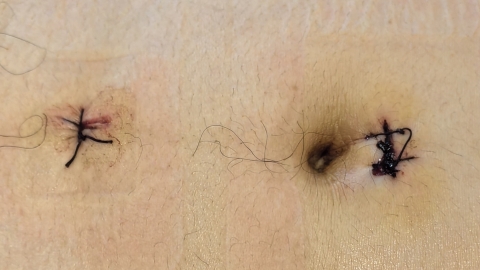What are the complications after appendectomy?
Generally, although appendectomy is a common surgical procedure, it may still lead to certain postoperative complications, including wound infection or pain, intestinal adhesions, residual appendicitis, pelvic abscess, and bowel dysfunction. The details are as follows:

1. Wound infection or pain: If the surgical incision is not properly cared for, infection may occur, manifesting as redness, swelling, heat, and purulent discharge from the wound, accompanied by significant pain. Even after healing, some patients may experience dull or stabbing pain at the incision site due to scar tissue formation or nerve damage, especially during weather changes or fatigue, affecting local comfort.
2. Intestinal adhesions: Surgical manipulation can cause the intestines to adhere to surrounding tissues. Mild adhesions may be asymptomatic, but severe cases can impair intestinal motility, leading to abdominal pain, bloating, and even intestinal obstruction—characterized by cessation of flatus and defecation, nausea, and vomiting—requiring prompt treatment to restore bowel patency.
3. Residual appendicitis: If the remaining stump of the appendix is too long after surgery, it may develop secondary inflammation. Symptoms resemble those of acute appendicitis, such as right lower abdominal pain and nausea, with some patients also experiencing low-grade fever. Diagnosis should be confirmed through clinical evaluation followed by targeted treatment.
4. Pelvic abscess: In patients with perforated appendicitis, pus may accumulate in the pelvic cavity after surgery, forming an abscess. This presents as a sensation of heaviness and pain in the lower abdomen, tenesmus (urgent but ineffective need to defecate), and in some cases, urinary frequency and urgency. Treatment typically involves percutaneous drainage or medication to eliminate the infection.
5. Bowel dysfunction: Surgery may disrupt normal intestinal motility rhythms, resulting in temporary bowel dysfunction. Patients may experience alternating diarrhea and constipation shortly after surgery, or changes in bowel habits. These symptoms usually resolve as bowel function gradually recovers; however, if they persist, dietary adjustments or medications may be needed to improve the condition.
After appendectomy, patients should pay attention to wound care, get out of bed and move early to reduce the risk of intestinal adhesions, maintain a light diet, and avoid overeating to promote faster recovery and minimize the likelihood of complications.





